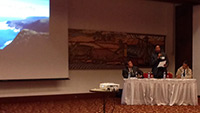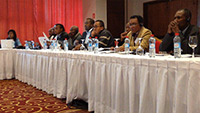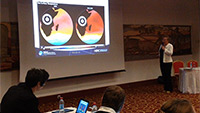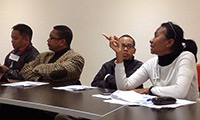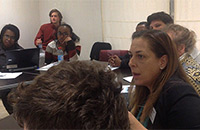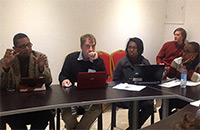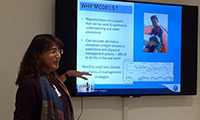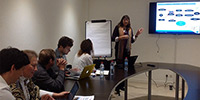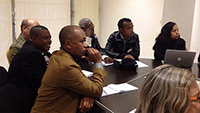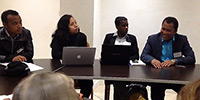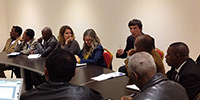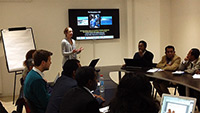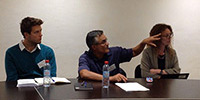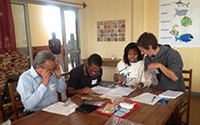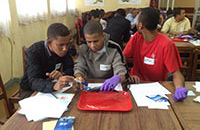
You are here: GLORIA Home » Workshop presentations and activities
Final Workshop Report
On this page:
- Introductions and welcome
- A2: Marine climate change projections
- A3: Ecological sensitivity assessment
- A4: Conceptual models of key ecological assets, processes and drivers
- A5-6: Vulnerability assessment
- A7-8: Mapping perceptions of change
- A9: Education and outreach workshop
- Workshop conclusions
Programme (PDF):

Workshop presentations and activities
Opening and welcome
The workshop was opened by Dr Hery Rakotondravony, Directeur du Bureau National de Coordination des Changements Climatiques (BNCCC) and Dr Kevern Cochrane, Rhodes University, South Africa, who gave an overview of the GLORIA project and the aims of the workshop.
Overview of GLORIA and the workshop objectives
Kevern Cochrane, email: K.Cochrane|at|ru.ac.za
Climate change adaptation in Madagascar
The National Adaptation Plan of Madagascar / Plan National d’Adaptation
Jane Razanamiharisoa, BNCCC.
Texts and Legislations on Climate Change and Adaptation in Madagascar
Nivohary Ramaroson, BNCCC.
Activity 2: Climate change projections
Convener:
Ekaterina (Katya) Popova, NOC, U.K. email: e.popova|at|noc.ac.uk
Katya Popova presented leading-edge projections of ocean physics, biogeochemistry and ecosystems at high resolution from the UK's National Oceanography Centre (NOC). Projections up to 2099, based on the 'business as usual' greenhouse gas emission scenario (RCP8.5).[1] were compared to current conditions. A smaller group of workshop participants later discussed the projected changes and their potential implications for Madagascar.
The Internation Panel for Climate Change (IPCC) have developed 40 scenarios for how human activities may contribute to future climate change. These make different assumptions about future levels of greenhouse gas pollution, land-use and other forces that drive global warming. The Representative Concentration Pathways (RCPs) are based on some of these scenarios and designed to make it easier to create climate change projections. The RCPs are consistent sets of greenhouse gas projections that lead to specific changes in the Earth's energy budget - the balance between incoming and outgoing radiation.
RCP8.5 is 'business as usual' - the pathway we are heading down if only limited action is taken to reduce greenhouse gas emissions, deforestation, etc. It assumes that populations continue to rise fast, that incomes will grow slowly, and that technological change and improvements to energy use will also be slow. In the long term this leads to high energy demand and high greenhouse gas emissions, leading to an imbalance in Earth's energy budget of 8.5 W m-2
Presentations:
Projections of the impact of climate change on the marine environment around Madagascar (PDF, 6 MB)
Ocean projection movies (web page with movies)
Activity 3: Ecological sensitivity assessment
Conveners:
Gretta Pecl, University of Tasmania, Australia, email: gretta.pecl|at|utas.edu.au
Harisoa Rakotondrazafy, WWF Madagascar, email: hrakotondrazafy|at|wwf.panda.org
Warwick Sauer, Rhodes University, South Africa, email: W.Sauer|at|ru.ac.za
Through presentations and discussions workshop participants reviewed existing approaches to highlight species and fisheries that are most vulnerable to climate change. Together they identified areas where more work may be required to resolve any uncertainties surrounding vulnerability to climate change and identify the key drivers and life cycle stages that determine high vulnerability.
Presentations:
Methods for assessing species sensitivity or vulnerability to climate change (PDF, 1.5 MB)
Methods applied by WWF Madagascar and Blue Ventures for biological and ecological factors
Madagascar Early Warning System, Manakasina Todisoa, BNCCC.
Modelling the transport of important fishery species in the Mozambique Channel and Agulhas Bank (PDF, 1.4 MB)
Activity 4: Modelling key ecological assets, processes and drivers
Conveners:
Éva Plagányi, CSIRO Oceans & Atmosphere, Australia, email: Eva.Plaganyi-Lloyd|at|csiro.au
Ingrid van Putten, CSIRO Oceans & Atmosphere, Australia, email: Ingrid.Vanputten|at|csiro.au
After an overview of current ecosystem modelling approaches, workshop participants collaboratively developed conceptual models of the system supporting species of importance to Malagasy coastal communities. Models were developed for the Octopus and crab fishery in which feedback between climate drivers and human pressures and was identified.
Presentation: Conceptual models of key ecological assets, processes and drivers (PDF, 4 MB)
Activity 5-6: Vulnerability assessment
Conveners:
Tomas Chaigneau, Exeter University, United Kingdom, email: tomc505|at|gmail.com
Ingrid van Putten, CSIRO Oceans & Atmosphere, Australia, email: Ingrid.Vanputten|at|csiro.au
Éva Plagányi, CSIRO Oceans & Atmosphere, Australia, email: Eva.Plaganyi-Lloyd|at|csiro.au
Harisoa Rakotondrazafy, WWF Madagascar, email: hrakotondrazafy|at|wwf.panda.org
Building on existing studies presentations and discussions, this activity centered on the economic, social, cultural, historical dependence of Malagasy people on the key marine species. Workshop discussions aimed to map the supply chains of key marine species and identify vulnerabilities and strengths within these chains. In addition more general coastal community vulnerabilities were discussed to build on existing information and identify future adaption research.
Presentations:
Methods applied by WWF Madagascar and Blue Ventures for social and other human aspects.
Recent field survey conducted by Rhodes University and IH.SM as a part of the GLORIA project
Vulnerability assessment of fishery supply chains (PDF, 2 MB)
Vulnerability assessment of fishing communities (PDF, 4 MB)
Activity 7-8: Perception of change, participatory mapping
Conveners:
Shankar Aswani, Rhodes University, South Africa, email: S.Aswani|at|ru.ac.za
Lucy Scott, Rhodes University, South Africa, email: lucy.scott|at|asclme.org
Tomas Chaigneau, Exeter University, United Kingdom, email: tomc505|at|gmail.com
The activity started with a rapid assessment where a team from Rhodes University and the University of Toliara worked with managers and community leaders in Toliara to map perceptions of change in two locations in the Toliara region. After a presentation on participatory mapping using GIS and remote sensing, and a report from the Toliara field work, workshop participants discussed the information in the light of other research carried out in Toliara and elsewhere in Madagascar.
Participatory GIS (PDF, 18 MB)
Geospatial Analysis for Integrating Human Knowledge Systems in Climate Change Adaptation Plans (PDF, 13 MB)
Understanding Peoples Perceptions of Climate Change in Coastal Madagascar (PDF, 6 MB)
Activity 9: Workshop on education and outreach
Conveners:
Adina Paytan, University of California Santa Cruz (UCSC), USA, email: apaytan|at|ucsc.edu
Mahatante Paubert, Institut Halieutique et des Sciences Marines (IH-SM), Madagascar
This one-day workshop aimed to provide tools that will enhance ocean literacy and promote engagement and concern with the state of the ocean.
GLORIA Education Workshop Scehdule: in French and in English (PDF, 0.6 MB)
Education Workshop presentation (PDF, 28 MB)
Education Workshop slides handout (PDF, 1.3 MB)
Workshop conclusions and recommendations
Overall conclusions and recommendations (DRAFT) (PDF, 1MB)

